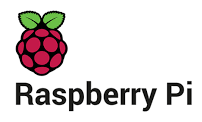 Raspberry Pi is a series of small single-board computers (SBCs) developed in the United Kingdom by the Raspberry Pi Foundation in association with Broadcom. The Raspberry Pi launched in 2012, and there have been several iterations and variations released since then. The original Pi had a single-core 700MHz CPU and just 256MB RAM, and the latest model has a quad-core CPU clocking in at over 1.5GHz, and 4GB RAM. The price point for Raspberry Pi has always been under $100 (usually around $35 USD), most notably the Pi Zero, which costs just $5.
Raspberry Pi is a series of small single-board computers (SBCs) developed in the United Kingdom by the Raspberry Pi Foundation in association with Broadcom. The Raspberry Pi launched in 2012, and there have been several iterations and variations released since then. The original Pi had a single-core 700MHz CPU and just 256MB RAM, and the latest model has a quad-core CPU clocking in at over 1.5GHz, and 4GB RAM. The price point for Raspberry Pi has always been under $100 (usually around $35 USD), most notably the Pi Zero, which costs just $5.
Raspberry Pi has all the features you expect from a computer: wireless internet connectivity, HDMI ports for your monitors, and USB ports for your accessories, along with ample processing power and RAM for all your day-to-day use. At 15 watts, Raspberry Pi uses just a fraction of the power draw of traditional PCs. Not only is this gentler on your wallet when it comes to your energy bills, it’s also kinder to the planet.
The Raspberry Pi is a very cheap computer that runs Linux, but it also provides a set of GPIO (general purpose input/output) pins, allowing you to control electronic components for physical computing and explore the Internet of Things (IoT). Raspberry Pi OS (previously called Raspbian) is the official supported operating system.
Raspberry Pi makes very popular single-board computers, especially for those interested in programming with Scratch or Python. They’ve also recently made their own microcontroller board. Raspberry Pi is used all over the world as an easy, affordable way to teach programming and physical computing to people of all ages and all backgrounds.
The Raspberry Pi Foundation works to put the power of digital making into the hands of people all over the world, so they are capable of understanding and shaping our increasingly digital world, able to solve the problems that matter to them, and equipped for the jobs of the future. They provide low-cost, high-performance computers that people use to learn, solve problems, and have fun. Raspberry Pi provides outreach and education to help more people access computing and digital making. They develop free resources to help people learn about computing and how to make things with computers, and train educators who can guide other people to learn.
